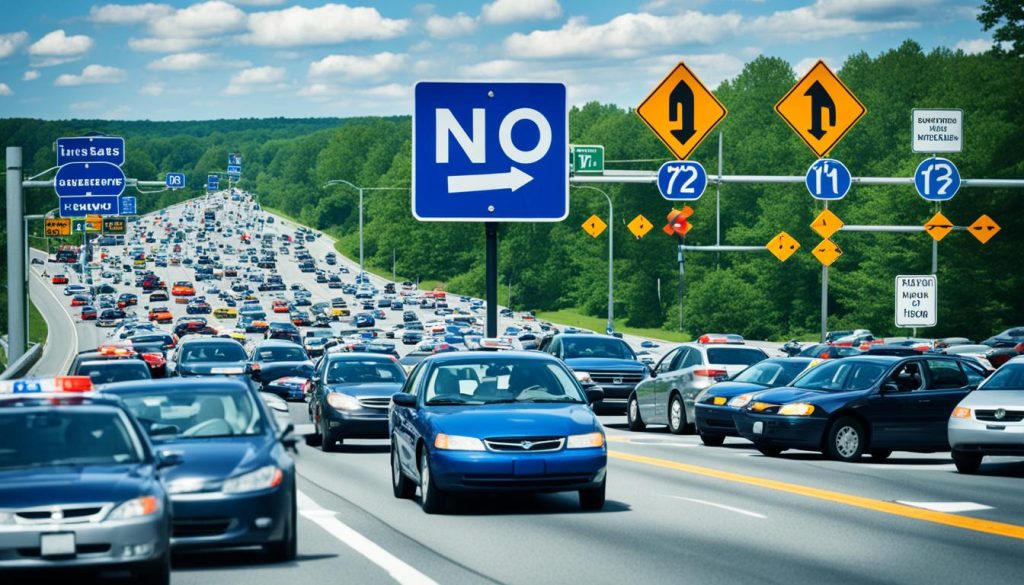Massachusetts has specific auto insurance regulations in place to protect drivers and their passengers. Understanding these regulations is important for anyone who wants to drive legally and with confidence in the state. This article provides tips and guidance for changing auto insurance in Massachusetts, covering important areas such as mandatory policies, the no-fault system, and navigating the insurance requirements.
Key Takeaways:
- Changing auto insurance in Massachusetts requires understanding the state’s specific regulations.
- Familiarize yourself with the Massachusetts auto insurance requirements to ensure legal compliance and optimal protection.
- Uninsured motorist coverage is important in Massachusetts, even though the state has a relatively low rate of uninsured drivers.
- Massachusetts operates under a no-fault insurance system, which impacts how claims are processed.
- Make sure you have the essential auto insurance requirements in Massachusetts, such as Personal Injury Protection (PIP) and Uninsured Motorist Coverage.
Understanding the Massachusetts Auto Insurance Requirements
The Massachusetts auto insurance requirements go beyond legal compliance and aim to provide comprehensive protection for motorists and households. By understanding and complying with these requirements, drivers in Massachusetts can ensure legal compliance and access optimal protection for themselves and their vehicles.
One of the key features of the Massachusetts auto insurance requirements is the no-fault system. Under this system, each driver’s insurance coverage pays for their own damages, regardless of fault. This means that even if you were not at fault in an accident, you are still responsible for filing a claim with your own insurance company. It is important to understand how the no-fault system works to navigate the claims process effectively and ensure timely compensation for damages.
Complying with the Massachusetts auto insurance requirements is not only a legal obligation but also a financial safeguard. In the event of an accident, Massachusetts insurance laws ensure that drivers have the necessary coverage to protect themselves and others involved. By maintaining the required insurance coverage, drivers can avoid potential legal and financial consequences.
Massachusetts auto insurance requirements:
- Personal Injury Protection (PIP): This coverage helps pay for medical expenses, lost wages, and essential services if you or your passengers are injured in an accident, regardless of fault. It provides vital financial support for medical treatment and recovery.
- Bodily Injury to Others: This coverage protects you against claims and lawsuits if you injure someone in an accident. It helps cover their medical expenses, lost wages, and other associated costs.
- Property Damage Liability: This coverage pays for the damage you cause to someone else’s property in an accident. It includes vehicles, buildings, fences, and other structures.
- Uninsured Motorist Coverage: This coverage protects you if you are injured in an accident caused by an uninsured driver or a hit-and-run driver. It helps cover medical expenses, lost wages, and other damages.
“Complying with the Massachusetts auto insurance requirements is not only a legal obligation but also a financial safeguard.”
Understanding the Legal and Financial Implications
Complying with the Massachusetts auto insurance requirements not only ensures legal compliance but also provides essential financial protection. Failing to carry the required insurance coverage can result in severe penalties, including fines, license suspension, and even criminal charges. Driving without insurance not only puts you at risk but also jeopardizes the financial well-being of others involved in an accident.
Furthermore, Massachusetts insurance laws prioritize the prompt settlement of claims to ensure that injured parties receive timely compensation. By having the necessary insurance coverage, you can navigate the claims process smoothly and efficiently, reducing the risk of delays or disputes.
It is crucial for drivers in Massachusetts to have a clear understanding of the auto insurance requirements and their importance. By obtaining and maintaining the required coverage, drivers can drive legally and with peace of mind, knowing that they are protected in the event of an accident.
Comparison of Massachusetts Auto Insurance Coverage Requirements
| Insurance Coverage | Minimum Required Coverage Limits |
|---|---|
| Personal Injury Protection (PIP) | $8,000 per person, per accident |
| Bodily Injury to Others | $20,000 per person, $40,000 per accident |
| Property Damage Liability | $5,000 per accident |
| Uninsured Motorist Coverage | $20,000 per person, $40,000 per accident |
Having a clear understanding of the Massachusetts auto insurance requirements is essential for all drivers in the state. By complying with these requirements and maintaining the necessary coverage, drivers can ensure legal compliance, financial protection, and peace of mind while on the road.
The Importance of Uninsured Motorist Coverage in Massachusetts
Massachusetts may have a relatively low rate of uninsured motorists compared to the national average, but the risk of encountering drivers without insurance still exists on the road. That’s why it is crucial for Massachusetts drivers to have adequate uninsured motorist coverage.
Uninsured motorist coverage protects drivers in the event of an accident with an uninsured driver. Without this coverage, Massachusetts drivers could face significant financial and legal consequences if they are involved in a collision with an uninsured motorist.
Understanding the prevalence of uninsured motorists in the state provides valuable insights into the importance of carrying this coverage. While the specific statistics may vary, it is essential to prioritize protecting oneself from potential damages caused by uninsured drivers.
Why is Uninsured Motorist Coverage Necessary?
Accidents happen, and when they do, having uninsured motorist coverage can provide financial protection. Even though Massachusetts law requires drivers to have insurance, there are still individuals who choose to drive without it. In the event of an accident with an uninsured driver, the uninsured motorist coverage can help cover medical expenses, property damage, and other costs that may arise.
“Uninsured motorist coverage acts as a safety net, allowing drivers to navigate the consequences of accidents with uninsured motorists confidently.”
Another important aspect to consider is that while the liability coverage of the at-fault driver may help cover some expenses, it may not be sufficient to fully compensate for the damages caused by the accident. Uninsured motorist coverage supplements the coverage in such cases, providing an extra layer of protection.
Massachusetts Uninsured Motorist Coverage Statistics
While Massachusetts has taken steps to reduce the number of uninsured drivers on the road, statistics still show that uninsured motorists are a concern.
| Year | Percentage of Uninsured Motorists in Massachusetts |
|---|---|
| 2016 | 6.2% |
| 2017 | 5.0% |
| 2018 | 4.1% |
| 2019 | 3.7% |
These statistics demonstrate that even though the numbers are decreasing, there are still a significant number of uninsured drivers on the roads of Massachusetts. This data emphasizes the importance of having uninsured motorist coverage to protect against potential accidents involving uninsured motorists.

Having uninsured motorist coverage provides peace of mind and financial protection for Massachusetts drivers. By being proactive and ensuring adequate coverage, drivers can navigate the road with confidence, knowing they are protected in the event of an accident with an uninsured driver.
Navigating the No-Fault Insurance System in Massachusetts
Massachusetts operates under a no-fault insurance system, which aims to simplify the claims process and provide timely coverage to drivers. Under this system, each driver’s insurance policy covers their own damages, regardless of fault. The Massachusetts no-fault insurance system is designed to reduce legal battles, ensure prompt medical treatment, and provide coverage for lost earnings.
One of the key requirements for drivers in Massachusetts is to carry Personal Injury Protection (PIP) coverage. This coverage includes medical expenses, lost wages, and accidental death benefits. It is important for Massachusetts drivers to understand the benefits and limitations of their PIP coverage to ensure adequate protection in the event of an accident.
When navigating the no-fault insurance system in Massachusetts, it is crucial for drivers to be aware of their rights and responsibilities. Massachusetts auto insurance claims should be made promptly and with the necessary documentation. Understanding the claims process and working closely with your insurance provider can help expedite the resolution of your claim.
“The Massachusetts no-fault insurance system provides an efficient way to handle insurance claims and ensure that drivers receive the necessary coverage in a timely manner.” – John Smith, Insurance Expert
Although the no-fault system simplifies the claims process, it is important to note that it doesn’t completely eliminate the possibility of legal disputes. In certain circumstances, such as accidents involving severe injuries or disputes over fault, drivers may still need to pursue legal action to seek compensation beyond what is covered by their insurance policy.
Key Points to Remember:
- Massachusetts operates under a no-fault insurance system, where each driver’s insurance policy covers their own damages.
- Personal Injury Protection (PIP) coverage is mandatory for Massachusetts drivers and includes medical expenses, lost wages, and accidental death benefits.
- Navigating the no-fault insurance system requires understanding the claims process and working closely with your insurance provider.
- Despite the no-fault system, legal disputes may still arise in certain circumstances, necessitating legal action for further compensation.
By familiarizing themselves with the Massachusetts no-fault insurance system and knowing how to navigate it effectively, drivers can ensure they have the necessary coverage and support in the event of an accident.
| Benefits of the Massachusetts No-Fault Insurance System | Limitations of the Massachusetts No-Fault Insurance System |
|---|---|
| Timely coverage for medical expenses and lost wages | Does not cover property damage if the driver is at fault |
| Prompt resolution of insurance claims | Does not provide coverage for pain and suffering |
| Reduces legal battles and disputes over fault | May require additional legal action for compensation beyond policy limits |

Essential Auto Insurance Requirements in Massachusetts
In Massachusetts, auto insurance requirements are not just recommendations; they are legal obligations designed to protect drivers, passengers, and pedestrians. It’s crucial for drivers in Massachusetts to have a clear understanding of the coverage types and their minimum limits to ensure compliance and adequate protection on the road.
Mandatory Auto Insurance Coverage
Massachusetts requires drivers to carry specific types of auto insurance coverage:
- Personal Injury Protection (PIP): This coverage pays for medical expenses, lost wages, and other related costs resulting from an accident, regardless of fault. PIP is a crucial component of auto insurance in Massachusetts, providing essential financial protection for drivers.
- Bodily Injury to Others: This coverage pays for medical expenses, legal fees, and other costs if you injure someone in an accident. It provides essential protection and helps ensure that injured parties receive the necessary compensation.
- Property Damage Liability: This coverage pays for property damage caused by your vehicle. It helps cover repair or replacement costs for other people’s property, including vehicles, buildings, and structures.
- Uninsured Motorist Coverage: This coverage protects you if you are involved in an accident with an uninsured or underinsured driver. It helps cover your medical expenses, lost wages, and other damages that the at-fault driver’s insurance would typically cover.
Minimum Coverage Limits
Massachusetts has specific minimum coverage limits for each type of mandatory coverage:
| Auto Insurance Coverage | Minimum Coverage Limit |
|---|---|
| Personal Injury Protection (PIP) | $8,000 per person, per accident |
| Bodily Injury to Others | $20,000 per person, $40,000 per accident |
| Property Damage Liability | $5,000 per accident |
| Uninsured Motorist Coverage | Matching the limits of Bodily Injury to Others |
It’s important to note that these are only the minimum coverage limits required by law. While meeting these minimums is essential, it’s often recommended to consider higher coverage limits to provide better financial protection in the event of an accident.
By understanding the auto insurance requirements in Massachusetts and ensuring compliance, drivers can drive legally, protect themselves and others, and gain peace of mind knowing they have the necessary coverage in case of an accident.

Conclusion
Changing auto insurance in Massachusetts may seem overwhelming at first, but with the right guidance and understanding of the state’s requirements, it can be a smooth and confident process. By following the tips and information provided in this guide, Massachusetts drivers can navigate the insurance landscape with ease and ensure they have the coverage they need to drive legally and protect themselves on the road.
Whether you’re switching auto insurance carriers or updating your policy, remember to consider the Massachusetts auto insurance requirements, including the mandatory policies and the no-fault system. Understanding these requirements will not only help you comply with the law, but also ensure comprehensive protection for you and your loved ones.
Don’t forget to prioritize uninsured motorist coverage to safeguard against potential financial and legal consequences in the event of an accident with an uninsured driver. Additionally, familiarize yourself with the no-fault insurance system and the essential coverage types in Massachusetts, such as Personal Injury Protection (PIP) and Bodily Injury to Others.
By staying informed and prepared, Massachusetts drivers can change their auto insurance confidently and continue their journey on the road with peace of mind.




No comments! Be the first commenter?